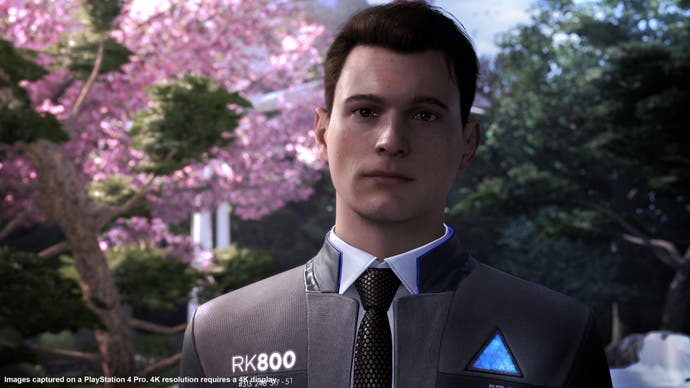Detroit: Become Human review - clumsy yet effective robot-rights thriller
Motor city blues.
The main menu screen for Detroit: Become Human - Quantic Dream's new game about androids discovering free will and rising up against their human masters - features the face, stunningly well realised, of an android who talks directly to the player. The android looks like a young, pretty, white woman. She asks if we are enjoying ourselves, suggests we take a survey, jokes about the game save being corrupted. If you leave the menu on long enough, she changes the subject. Did we know about the underground railroad, the secret network which helped black slaves escape the antebellum South of the USA? Then she starts to sing, quietly, pleadingly: "Hold on just a little while longer, everything will be alright." It turns out this is a traditional gospel song. She might as well have burst into "We Shall Overcome."

Intentionally or not, it's a jarring moment. It also puts the lie to comments writer-director David Cage has made to the effect that his was just a science-fiction story about robots gaining consciousness, and any political or social-historical parallels in the real world were in the eye of the beholder. They are, in fact, quite clearly intended. Cage deliberately evokes slavery and the civil rights movement in the androids' plight.
Before we get caught up in its own delusions of grandeur, it's worth remembering that Detroit is just another of Quantic's glossy, goofy, ambitious experiments in interactive cinematic storytelling, like Fahrenheit, Heavy Rain and Beyond: Two Souls - and worth stating that it's the most successful of these by far. The story is coherent and persuasively told, avoiding Cage's trademark last-act lunge into nonsense. It's systematically sound enough to be enjoyed as a video game, too.
Detroit has three story strands focusing on three lead characters, all androids. Kara (Valorie Curry) is a domestic servant belonging to Todd, an abusive father and drug addict. After breaking her bonds she goes on the run with Todd's daughter, Alice, looking to get to safety north of the border in Canada, which has no android laws. Markus (Jesse Williams) is the carer for a cantankerous yet kindly artist played by Lance Henriksen. Deactivated and discarded for a crime he didn't commit, Markus finds, joins and ultimately leads an android resistance movement called Jericho. Connor (Bryan Dechart) is an advanced model assigned by the android manufacturers CyberLife to assist the police with their enquiries into "deviants" - the term for androids like Kara and Markus who have learned to break their programming and who seek freedom from human instruction. He's the most ambiguous and interesting character of the three, and in classic chalk-and-cheese buddy-cop style, he's paired with Hank (Clancy Brown), a slovenly, android-hating alcoholic. (Cage likes to go all-in on his characterisation - no cliché is left uncompounded by three more.)
Like previous Quantic Dream games, Detroit is a technical tour-de-force, featuring extraordinarily lifelike rendering and nuanced performance capture; Digital Foundry's John Linneman argues, rightly, that it's a rare and exciting example of cutting-edge technology being brought to bear to create something more intimate than the usual vast playgrounds. Detroit in 2038 is convincingly realised in the richly textured locations and credible technologies. It's neither utopia nor dystopia, and it's recognisable as our world.
Also like previous Quantic Dream games, Detroit unfolds in tightly-controlled scenes which combine dialogue - fulsome in options, cheesy and leaden in tone - with a modest amount of exploration and a weirdly compelling fascination with the most mundane of interactions. It's always asking you to twist a stick to open a door, tilt the controller to pour a drink, swipe the touchpad to read a magazine. Initially gauche, this control language is so persistently applied that it does end up drawing you deeper into the game - and the shift into "quick-time event" action scenes feels more natural than it does in other games. The androids' computational overlays allow for some fun embellishments: Connor, investigating a crime scene, can analyse evidence to create a wireframe reconstruction of events that can be spooled like 3D video, while Markus can pre-visualise parkour routes to calculate their chance of success.
Of course, Detroit is constantly presenting you with choices, too - whether to kill or spare, be aggressive or sincere, take the low road or the high. These feed into what the studio says is its most sophisticated branching narrative to date, with dozens of possible paths and outcomes. We've heard that before, and even those who enjoy this genre of interactive storytelling may have an earned scepticism about how much their choices really affect. But this time, Quantic has taken the brave - and on balance, I think brilliant - decision to show their working, to wave away the smoke and point out the mirror.

Detroit allows you to study the flowchart of each scene even as you play it, so you can see the full extent of choices offered to you, which choices are meaningful and which aren't. Choices which have an impact beyond the chapter you're currently playing are clearly signposted. Towards the end of the game, the flowcharts start to sprawl, with multiple entry points, multiple paths and eventually, entirely separate charts for major story deviations. During play, you get clear on-screen feedback when new options or paths have been unlocked. You can choose to go back and replay scenes at any point, although the game recommends that you stick to your decisions and play it through once before you start mucking around in the story matrix.
The flowchart dispels the illusion - by now rather faint, it must be said - of a living, breathing narrative, and breaks immersion to some extent. But this clear visibility on the guts of the game gives you a level of confidence in your interaction with it that's unprecedented in this genre. As a rule, video games are easier to enjoy when you fully understand their systems, and it turns out that's true of interactive narrative, too. The flowchart is also a powerful motivator for replaying scenes or the whole game later on: discovering what lies behind those locked options and paths, improving your completion percentages, collecting secrets and story deviations like loot. (It's a shame that, if you replay one scene and unlock a new story path in later chapters, you have to play the intervening chapters to see the effect, though.) Detroit is more comfortable being a video game and less driven by cinematic status envy than Quantic Dream's previous work, and it's better for it.
Perhaps because it would be exposed in this way - or perhaps because Cage, who still enjoys the sole writer credit, worked with a writing team for the first time - Detroit is a much more disciplined piece of storytelling, too. There are no weird excursions or flashbacks; all three storylines have a strong forward momentum, there's a consistent timeline, they cross paths and knit together neatly at the end. Most impressively, from what I've seen - and from talking to other players - most of the many permutations of the ending work in their own right. On my first playthrough, my story ended up somewhere much darker and bleaker than I expected or would have sought. But it was still a dramatically satisfying conclusion, with meaningful resonance between the three characters' fates, and it didn't suffer from the dissatisfying abruptness and sense of incompletion that so many 'bad' endings do. It felt like an ending, not a fail state.
Cage is still Cage, though. Rarely one for subtlety or understatement, his dialogue is clunky and often painfully on-the-nose, his female characters are either sexy or in peril (or both), and he has a tendency to go straight for the emotional jugular. The scene in which Kara discovers Todd's physical abuse of Alice was hotly debated after it was shown late last year; it's not so egregious in context (quite why you'd choose it as a marketing beat is beyond me), but it does play a sensitive issue, loudly and manipulatively, to the gallery. Curry is likeable and empathetic, but Alice is a thinly realised motivator for Kara's sentimental journey of self-discovery. Markus, despite Williams' good looks, never comes alive as a charismatic revolutionary - he's a bit of a bore. Connor is something else, though. Dechart, well cast for his coolly drawn face and the insistent quality of his voice, plays him with an eerie, controlled energy. It's fun to bounce him off Hank, the police-procedural gameplay of his sections is the most conventionally engaging and, unlike the others, he operates in a grey area where he may or may not turn deviant, which makes the choices he faces less stark but more interesting.
What he isn't, though - what none of them are - is a convincing machine intelligence. The androids in Detroit behave, talk, emote, respond like people, and not because they've been programmed to; if anything, once they break their programming, they only seem more human. Cage may well have set out to explore what happens when artificial intelligence gains consciousness, and fair play to him if he did - it is one of the most fascinating, thrilling and terrifying questions that can be posed by science-fiction and it is rapidly moving toward the realm of fact. It has been interestingly and even movingly explored in recent films like Ex Machina and Her. But Cage doesn't have the wit or the intellect to write machines as machines; he can't imagine intelligences that are different to human beings or that want different things. His androids are types: the idealist, the cold professional, the frustrated mother. They want love, family, success at work, a home of their own.
And so we end up with a story about humans oppressing and enslaving other humans, and the obvious parallels - particularly black slavery and the black civil rights struggle in the US - would suggest themselves even if they weren't explicit in the setting or heavily suggested in the subtext. This is not without its grace notes. The choice of Detroit, the now-ruined home of the American automotive industry, once a refuge and cultural hotbed for black America, as the setting and the centre of the android industry is a clever and resonant one. In a rare moment of sensitivity, Rose, a black character who assists Kara in her escape, alludes gently to the underground railroad as her inspiration for helping the deviant androids. But Cage blunders about this delicate terrain, too, conflating imagery concepts that don't belong together. Markus' options as leader of the android rebellion more or less boil down to 'Martin Luther King' or 'Che Guevara', but the game more often plays him as a dully ineloquent Christ figure, 'liberating' androids from servitude and recruiting them to his cause with the laying on of hands - whether they like it or not. Hang on, wasn't this all about free will?

The slavery subtext also pushes the game into a very black-and-white moral space where deviants are good and humans are evil, which closes off some interesting topics - like the very real threat that AI represents to human employment - and undermines the game's attempt to explore moral dilemma. Why bother trying to influence public opinion, a mechanic in the game, if regardless of what you do, the media coverage will paint androids as terrorists and humans will end up exterminating androids in concentration camps? (Yep - Cage goes to the Holocaust too.) I started my game on a pacifist and conciliatory route, but the lack of any kind of sympathetic human viewpoint wore me down.
Most worrying of all, though, I can't shake the feeling that Cage is trying to have his cake and eat it. That he is seeking to borrow the seriousness, the intensity, the emotional and moral weight of a very real and very painful struggle without engaging with all of its very real issues and without having to pick a side in the present, fraught cultural moment. Playing Detroit, everyone can identify with the handsome, multi-ethnic oppressed, and nobody has to look the oppressors in the eye and see themselves.
With this glib, rabble-rousing and admittedly enjoyable thriller, Quantic Dream has finally delivered on the promise of its interactive storytelling format, and resolved its difficult relationship with cinema. Its difficult relationship with the real world, though, is just beginning.










